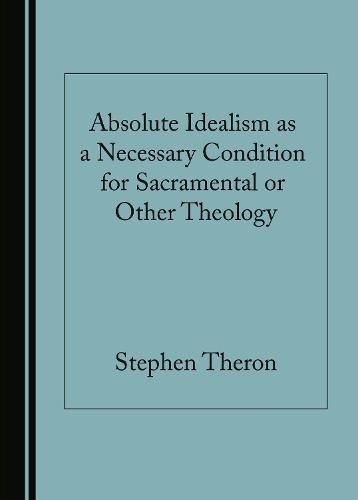Readings Newsletter
Become a Readings Member to make your shopping experience even easier.
Sign in or sign up for free!
You’re not far away from qualifying for FREE standard shipping within Australia
You’ve qualified for FREE standard shipping within Australia
The cart is loading…






This book bridges the gap between the sacramental praxis of Christian religion, seemingly dependent upon naive acceptance of phenomena in their immediacy, and the mediation of spiritual reality via philosophy of mind, and self-consciousness generally. Thus, it is a philosophy of incarnation as, inter alia, discrete essence of the Hegelian dialectic as the absorbing and thereby cancelling of finitude in the Absolute as its own Idea and, consequently, the total converse of pantheism. The Aristotelico-Hegelian concept of substance as mediated by visible accidents , the phenomena, is essential here. Thus Nature, but not the substance, which is Nature’s idea, is a self-conflicting phenomenon only, generating natural misconceptions in us, its offspring. Hence self-consciousness, the I , is to be perfected in its self-confident development towards the Absolute Idea, with which each finite idea is identical in absorption and difference, while religion becomes absolutised in, or as, sophia, chief intellectual virtue according to Aquinas. Here, a new theology, product of faith, resumes the old. It is time to put it to work.
$9.00 standard shipping within Australia
FREE standard shipping within Australia for orders over $100.00
Express & International shipping calculated at checkout
This book bridges the gap between the sacramental praxis of Christian religion, seemingly dependent upon naive acceptance of phenomena in their immediacy, and the mediation of spiritual reality via philosophy of mind, and self-consciousness generally. Thus, it is a philosophy of incarnation as, inter alia, discrete essence of the Hegelian dialectic as the absorbing and thereby cancelling of finitude in the Absolute as its own Idea and, consequently, the total converse of pantheism. The Aristotelico-Hegelian concept of substance as mediated by visible accidents , the phenomena, is essential here. Thus Nature, but not the substance, which is Nature’s idea, is a self-conflicting phenomenon only, generating natural misconceptions in us, its offspring. Hence self-consciousness, the I , is to be perfected in its self-confident development towards the Absolute Idea, with which each finite idea is identical in absorption and difference, while religion becomes absolutised in, or as, sophia, chief intellectual virtue according to Aquinas. Here, a new theology, product of faith, resumes the old. It is time to put it to work.